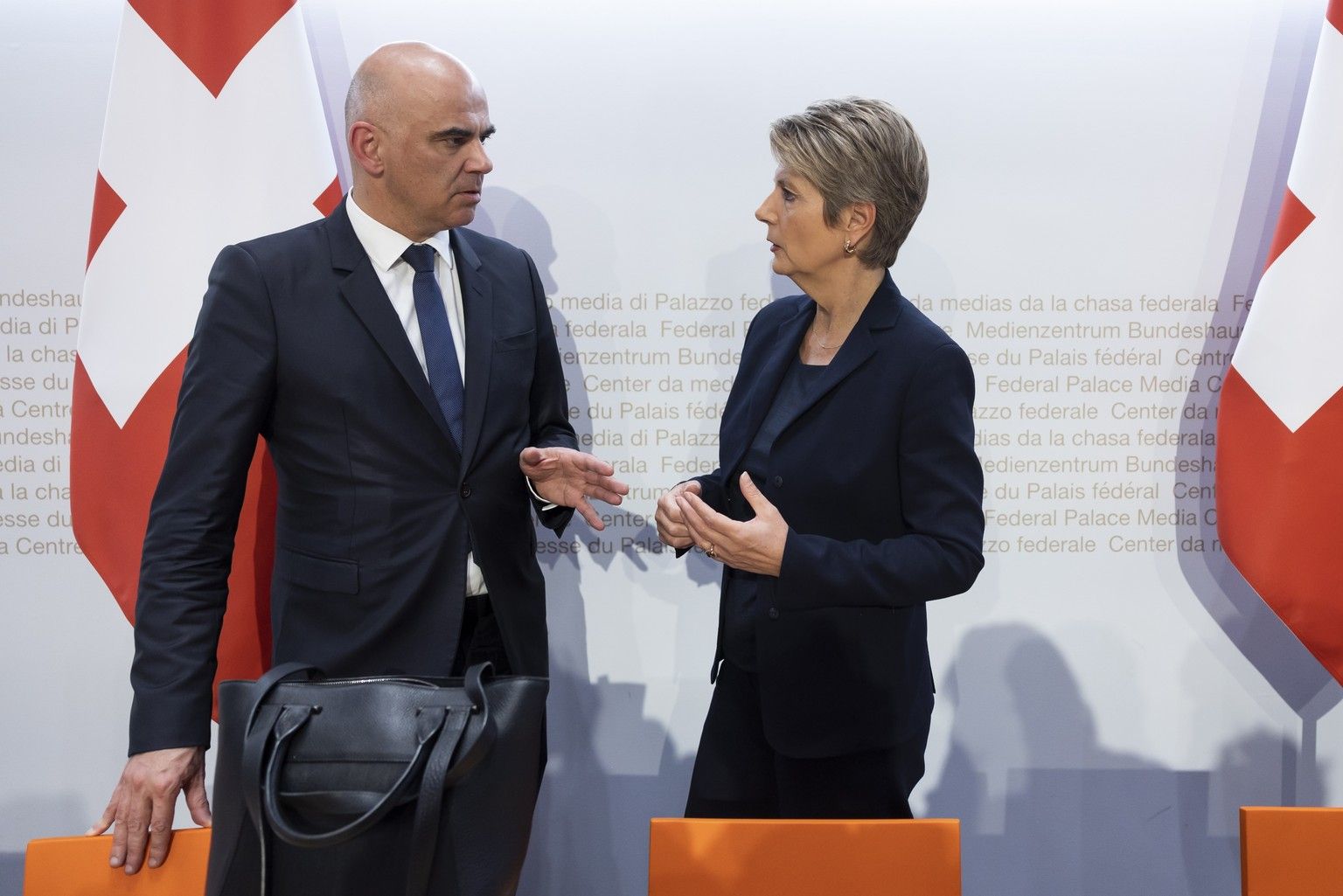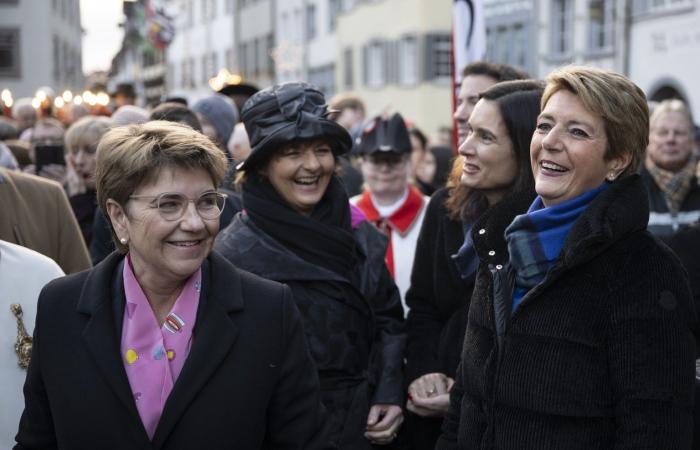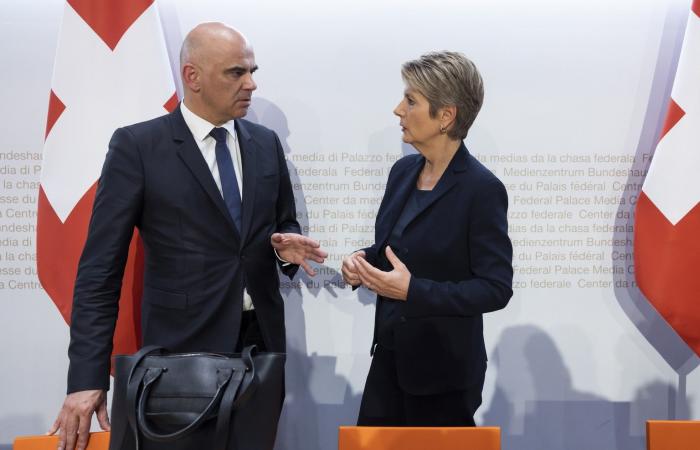Karin Keller-Sutter (PLR) and Albert Rösti (UDC) are considered the “engine” of the right in the Federal Council.Image: keystone
Comment
The UDC/PLR majority around Karin Keller-Sutter and Albert Rösti is considered the “center of power” within the Federal Council. But its strength also relies on the weakness of the other members.
The “charm” of the Federal Council is based on the principle of concordance. The four most powerful parties in Parliament are integrated into the country’s relatively small government. The goal is to craft decisions that are likely to garner a majority and can withstand a popular referendum. So much for the theory. In practice, however, the situation is a little more complex.
But lately, this system seems to be getting out of balance. We hear more and more often complaints about the domination of the right-wing majority of the UDC and the PLR. This “gang of four” imposes its demands without taking into account the PS and the Center. The resulting frustration is said to have contributed to the resignation of the head of the Federal Department of Defense Viola Amherd.

Viola Amherd (left) at the Keller-Sutter presidential party in Wil: the harmony is only a facade.Image: keystone
It was said that the Federal Councilor of the Center, Viola Amherd, had exhausted herself in the power struggle with Finance Minister Karin Keller-Sutter (PLR) over the army budget. A glimpse of this tension was given at the presidential ceremony in honor of Karin Keller-Sutter in December in Wil (SG), where the outgoing President of the Confederation, Amherd, gave a speech full of biting humor, embellished with piquant remarks against his successor.
Major influence in the Federal Council
The feud broke out last September. According to our information, Amherd then refused to present, with Keller-Sutter and Albert Rösti, the broad outlines of the savings program based on the report of the Gaillard group of experts. It was Elisabeth Baume-Schneider who had to take on this thankless task in his place.
Keller-Sutter and Rösti are seen as a powerful duo within the four-member right-wing bloc, with Guy Parmelin (UDC) and Ignazio Cassis (PLR) in their wake. This perception is widely shared by the population, as revealed by a Sotomo poll in December. When citizens are asked about the influence of members of government, Rösti and Keller-Sutter come out on top.
Criticism of the Center
They are said to impose their demands bluntly when necessary, and not just in matters of financial policy or savings. For the financing of the 13th AVS pension, Baume-Schneider and his interior department would have preferred a combination of salary percentages and VAT, but the Federal Council decided to opt for a solution based solely on VAT.
The minority of the PS and the Center is very angry. The Federal Council is currently relying too much on the power of the bloc of four of the SVP and the PLR, criticized the president of the Center Gerhard Pfister in the Sunday newspaper:
“It is all the more problematic as it corresponds neither to the majority in Parliament nor to the will of voters”
Revenge for Ruth Metzler
Parliamentary group leader Philipp Matthias Bregy doubled down on the NZZ on Sunday: “The rigid bloc of four members of the Federal Council, made up of the PLR and the UDC, is not ideal for the political balance of the country. The four do everything when they want. Behind these declarations, there are a lot of party tactics: the Center wants in the medium and long term to take a seat in the PLR.
-This would be revenge for the loss of the seat in 2003, when Ruth Metzler, then PDC federal councilor, was disavowed by the UDC and the PLR, in favor of Christoph Blocher. Already at the time, there were fears that the gang of four UDC/PLR would “govern through”. Instead, Blocher and Pascal Couchepin (PLR) engaged in a permanent power struggle.
Aware of power and organization
After an eight-year “interlude” with Eveline Widmer-Schlumpf (PBD), the four-member right-wing bloc was reinstalled in 2015. Initially, this did not attract much attention. However, the situation changed in 2018, when the rather reserved liberal-radical Johann Schneider-Ammann was replaced by the dynamic Karin Keller-Sutter.

Alain Berset could stand up to Karin Keller-Sutter. The current PS duo succeeds less well.Image: keystone
She found her ideal partner in Albert Rösti (UDC), who was elected to the Federal Council in 2022 to replace Ueli Maurer. He brought the Department of Environment and Transport (Detec) into line with the motto “easy going, but tough at heart”. With Parmelin and Cassis, the gang of four is increasingly succeeding in this within the entire Federal Council.
“Not a weak personality yet!”
However, every medal has its other side. The strength of the right-wing bloc also reflects the weakness of other members. This emerged during an interview with a former close friend of the Federal Council. Asked about the candidacy of Martin Candinas to succeed Amherd, he raised his arms to the sky:
“Not a weak personality yet, please!”
This remark was aimed at the lack of leadership experience of this jovial Grison. However, the assertion was notable because this insider had himself evolved within the right-wing bloc. According to him, if Keller-Sutter and Rösti have such freedom of action, it is also because they have few opponents equal to them.
A charismatic person wanted
This is particularly true for the PS duo. Alain Berset was an “alpha”, he could stand up to Karin Keller-Sutter. Simonetta Sommaruga was also a strong figure. Elisabeth Baume-Schneider, on the other hand, seems to be struggling to shed a lightweight image, and Beat Jans has also struggled so far, and not just because of his unloved department .
It would be all the more desirable for the Center to find a person of stature to succeed Amherd. Gerhard Pfister and Philipp Matthias Bregy are believed to be capable, but both have withdrawn from the race. The same goes for other favorites, including Candinas. This doesn’t necessarily mean anything, but it’s not an ideal starting situation.
But the power of the bloc of four is not unlimited. The Swiss system of semi-direct democracy ensures this. In November he inflicted a painful defeat on Albert Rösti during the motorway extension. And it is not at all certain that Keller-Sutter will succeed in pushing through his savings plan. It could already clash with Parliament.
The news in Switzerland is here
Translated and adapted by Noëline Flippe









